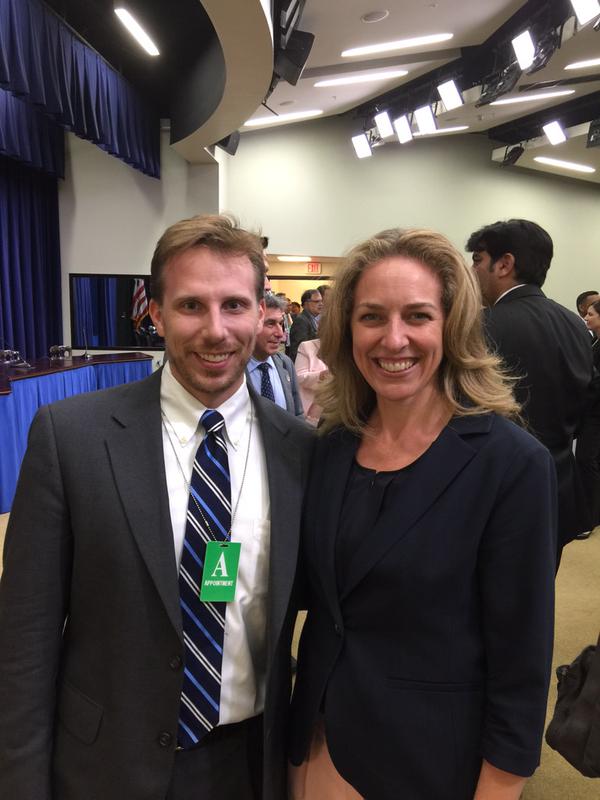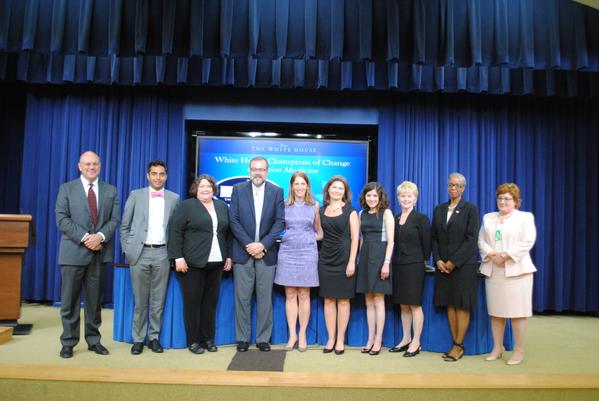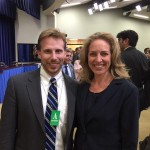

Nine Precision Medicine “Champions of Change” were honored at a White House event on Wednesday, July 8. I count everyone in that picture as a community colleague — and some as dear friends.
My role at the event was to moderate a discussion with four of the Champions: Amy Gleason, Anish Sebastian, Hugo Campos, and Howard Look.
In my introduction to the panel, I talked about how this was a panel about data liberation. These four Champions demonstrate how essential it is for individuals to have access to their data, to lift the false boundary between home and clinical care, and to allow patient autonomy to flourish.
Data liberation requires collaboration among stakeholders: patients, family caregivers, clinicians, and yes, government. By listening to each other, we can understand the pain points on both sides and recognize when we need to revisit existing policies, practices, and systems.
Our overall mission in the federal government — in the words of DJ Patil, our Chief Data Scientist — is to enable patients to access their electronic health data easily and contribute it for research. To me, that includes personal research — the right to pursue answers to your own health questions.
My mission as Chief Technology Officer of HHS is to democratize access to data, information, and tools for innovation, to help build communities of practice, and to bring in outside talent and know-how when we need it.
Symplur captured a tweet transcript of the event, but I want to add, as always, that the conversation is never over. Here is a sample of the questions that the panelists posed to each other:
- Why is precision medicine — the right care at the right time for the right person — important to you?
- What do you say to people who say, “Only trained medical professionals should be making therapy decisions based on the data?”
- Why is patient autonomy important?
- What would you change for others who come after us? What one barrier would you lift, if you could?
Please contribute your ideas in the comments below.
 On a personal note, another highlight of the event was meeting Matt Might, whose story has inspired me from afar for many years, as I wrote in this post: Every-day Magic.
On a personal note, another highlight of the event was meeting Matt Might, whose story has inspired me from afar for many years, as I wrote in this post: Every-day Magic.
His work on behalf of his son is emblematic of why I look to people living with rare disease as the “alpha geeks” of health care.
Susannah Fox, thank you for encouraging discussion about the use of patient data to produce healthier outcomes. Today, the U.S. House overwhelmingly passed HR6 which will speed up medical device approvals. The rhetoric is industry-laden and omits the concerns of harmed patients and their advocates because actual patient outcomes are not a cogent and active component of medical device approval/recall/regulation. This omission places patients in harms way and the judicial system is like offering a skydiver a parachute AFTER he/she takes a hard landing. Ask the 80,000 women harmed by pelvic surgical mesh in MDL in federal court and the 18,000 women harmed by Bayer Essure ‘permanent’ birth control coils who will meet with the FDA on September 24. I trained 2010 at the FDA as a Patient Representative, serve as a member of Consumers Union Safe Patient Project, a Walking Gallery member and attended Stanford MedX. I am an engaged patient advocate.
Thanks, Joleen — always appreciate your comments. Just spent some time reading about those pelvic mesh cases — yikes.
The discussion on Wed. focused on medical devices that collect and/or transmit data, often to a clinician but not to a patient who is actually wearing the device.
Great post and great event.
I had the privilege to meet Howard Luck at the Diabetes Mine conference last November. The Type 1 Diabetes community is one of the most active in hacking health and working with the FDA and device makers to improve their quality of life. Others should follow their lead and that of all of the presenters at the White House event.
Yes! The #wearenotwaiting team is one to watch, that is for sure. I loved watching Howard & Hugo talk about their successes & failures in freeing data. Howard described the diabetes community as gathering its “pitchforks and torches” in order to free the data from 6 out of 7 CGM manufacturers. I joked that he should loan some of those pitchforks to Hugo, but it was a serious suggestion: I think lots of people could learn from Howard’s playbook.
Simply put: I. Cannot. Wait. for the recording of this event.
I was invited to be there but was tending to my wife’s miraculous post-knee-surgery recovery. So I can’t wait!
Yay for Ginny! And yay for watching the recording and continuing the conversation.
Like many others I expect, I watched and tweeted from the comfort of home, but wished desperately that I could have been there in person to discuss many of these issues with those I’ve met on social media or personally. It’s funny still how small the core group of people is on these important issues. I’ll consider personalized medicine successful when the issue is so accepted that I may not know the panelists! These discussions also always spur new thoughts so I can’t wait to review the Twitter feed again!
Why is precision medicine — the right care at the right time for the right person — important to you?
This thought is nicely borrowed from the historical 5 Rights of Medication Administration for Nurses. As such, this truth is important as it is central to the care I provide as well as the medical apps we develop http://bit.ly/NursesandMhealth.